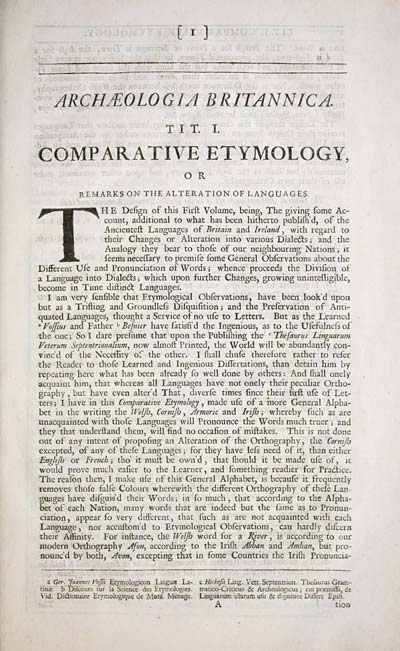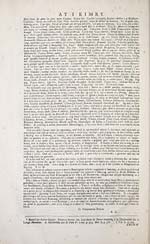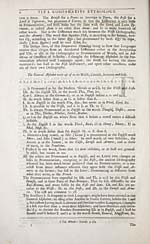Blair Collection > Archaeologia Britannica, giving some account additional to what has been hitherto publish'd, of the languages, histories and customs of the original inhabitants of Great Britain
(25)
Download files
Complete book:
Individual page:
Thumbnail gallery: Grid view | List view

[I]
ARCHJEOLOGIA BRITANNIC A.
TIT. I.
COMPARATIVE ETYMOLOGY,
O R
REMARKS ON THE ALTERATION OF LANGUAGES.
TH E Defign of this Firft Volume, being, The giving fome Ac-
count, additional to what has been hitherto publifn'd, of the
Ancienteft Languages of Britain and Ireland , with regard to
their Changes or Akeration into various Dialedts ; and the
Analogy they bear to thole of our neighbouring Nations ; it
feems neceflary to premife Ibme General Obfervations about the
Diflferent Ule and Pronunciation of Words ; whence proceeds the Divifion of
a Language into Dialedts ; which upon further Changes, growing unintelligible,
become in Time diftindt Languages.
I am very lenfible that Etymological Obfervations, have been look'd upon
but as a Trifling and Groundlels Dilquifition ; and the Prefervation of Anti-
quated Languages, thought a Service of no ule to Letters. But as the Learned
' Fofftus and Father i' Befmer have fatisfi'd the Ingenious, as to the Ufefulnefs of
the one; Sol dare prefume that upon the Publifliing the ^Thefaurus Linguarum
Veterum Septentrionalium^ now alinoft Printed, the World will be abundantly con-
vinc'd of the NecelHty of the other. I fliall chule therefore rather to refer
the Reader to thofe Learned and Ingenious Differtations, than detain him by
repeating here what has been already fo well done by others : And fliall onely
acquaint him, that whereas all Languages have not onely their peculiar Ortho-
graphy , but have even alter'd That , diverle times fince their firft ufe of Let-
ters; I have in this Comparative Etymology ^ made ule of a more General Alpha-
bet in the writing the IVelJh^ CorniJJj , Armoric and Irijh ; whereby fuch as are
unacquainted with thofe Languages will Pronounce the Words much truer ; and
they that underftand them, will find no occafion of miftakes. This is not done
out of any intent of propofing an Alteration of the Orthography, the Cornijb
excepted, of any of thele Languages ; for they have lels need of it, than either
Englijh or French ; tho" it niuit be own'd , that fliould it be made ufe of, ic
would prove much eafier to the Learner, and fbmething readier for Practice.
The rea(bn then, I make ufe of this General Alphabet, is becaufe it frequently
removes thofe falle Colours wherewith the different Orthography of thefe Lan-
guages have difguis'd their Words; in fb much, that according to the Alpha-
bet of each Nation, many words that are indeed but the fame as to Pronun-
ciation, appear fo very different, that fucli as arc not acquainted with each
Language, nor accullom'd to Etymological Obfervations, can hardly- difcern
their Affinity. For inftancc, the Weljh word for a J^ver , is according to our
modern Orthography Jfon., according to the Irifli Abban and Amhan^ but pro-
nounc'd by both, Avon.^ excepting that in fome Countries the Irifli Pronuncia-
a Ger. Joannes Vojjii Etymologicon Lingusc La- c Hickefii Ling. V'etc. Septcntrion. Thcfaurus Grwn-
tinae. b DHcours fur la Science dcs Etymologies. matico-Cricicus & Archeologicus ; cui pra;iniQa, de
Nid. Diftionairc Etymologique de Monl". Menage. Linguarum iitarum ufu & dignitatc Diflerc Epift.
A tioo
ARCHJEOLOGIA BRITANNIC A.
TIT. I.
COMPARATIVE ETYMOLOGY,
O R
REMARKS ON THE ALTERATION OF LANGUAGES.
TH E Defign of this Firft Volume, being, The giving fome Ac-
count, additional to what has been hitherto publifn'd, of the
Ancienteft Languages of Britain and Ireland , with regard to
their Changes or Akeration into various Dialedts ; and the
Analogy they bear to thole of our neighbouring Nations ; it
feems neceflary to premife Ibme General Obfervations about the
Diflferent Ule and Pronunciation of Words ; whence proceeds the Divifion of
a Language into Dialedts ; which upon further Changes, growing unintelligible,
become in Time diftindt Languages.
I am very lenfible that Etymological Obfervations, have been look'd upon
but as a Trifling and Groundlels Dilquifition ; and the Prefervation of Anti-
quated Languages, thought a Service of no ule to Letters. But as the Learned
' Fofftus and Father i' Befmer have fatisfi'd the Ingenious, as to the Ufefulnefs of
the one; Sol dare prefume that upon the Publifliing the ^Thefaurus Linguarum
Veterum Septentrionalium^ now alinoft Printed, the World will be abundantly con-
vinc'd of the NecelHty of the other. I fliall chule therefore rather to refer
the Reader to thofe Learned and Ingenious Differtations, than detain him by
repeating here what has been already fo well done by others : And fliall onely
acquaint him, that whereas all Languages have not onely their peculiar Ortho-
graphy , but have even alter'd That , diverle times fince their firft ufe of Let-
ters; I have in this Comparative Etymology ^ made ule of a more General Alpha-
bet in the writing the IVelJh^ CorniJJj , Armoric and Irijh ; whereby fuch as are
unacquainted with thofe Languages will Pronounce the Words much truer ; and
they that underftand them, will find no occafion of miftakes. This is not done
out of any intent of propofing an Alteration of the Orthography, the Cornijb
excepted, of any of thele Languages ; for they have lels need of it, than either
Englijh or French ; tho" it niuit be own'd , that fliould it be made ufe of, ic
would prove much eafier to the Learner, and fbmething readier for Practice.
The rea(bn then, I make ufe of this General Alphabet, is becaufe it frequently
removes thofe falle Colours wherewith the different Orthography of thefe Lan-
guages have difguis'd their Words; in fb much, that according to the Alpha-
bet of each Nation, many words that are indeed but the fame as to Pronun-
ciation, appear fo very different, that fucli as arc not acquainted with each
Language, nor accullom'd to Etymological Obfervations, can hardly- difcern
their Affinity. For inftancc, the Weljh word for a J^ver , is according to our
modern Orthography Jfon., according to the Irifli Abban and Amhan^ but pro-
nounc'd by both, Avon.^ excepting that in fome Countries the Irifli Pronuncia-
a Ger. Joannes Vojjii Etymologicon Lingusc La- c Hickefii Ling. V'etc. Septcntrion. Thcfaurus Grwn-
tinae. b DHcours fur la Science dcs Etymologies. matico-Cricicus & Archeologicus ; cui pra;iniQa, de
Nid. Diftionairc Etymologique de Monl". Menage. Linguarum iitarum ufu & dignitatc Diflerc Epift.
A tioo
Set display mode to: Large image | Transcription
Images and transcriptions on this page, including medium image downloads, may be used under the Creative Commons Attribution 4.0 International Licence unless otherwise stated. ![]()
| Permanent URL | https://digital.nls.uk/78365925 |
|---|
| Description | A selection of books from a collection of more than 500 titles, mostly on religious and literary topics. Also includes some material dealing with other Celtic languages and societies. Collection created towards the end of the 19th century by Lady Evelyn Stewart Murray. |
|---|
| Description | Selected items from five 'Special and Named Printed Collections'. Includes books in Gaelic and other Celtic languages, works about the Gaels, their languages, literature, culture and history. |
|---|

